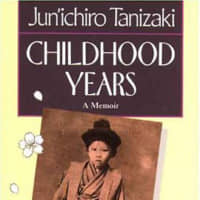Autobiographies tend to reveal only as much as the subject chooses to share. In "Childhood Years," Junichiro Tanizaki — famously impervious to ostracism — is surprisingly forthright in detailing his inner life, especially those pertaining to the germination of his sexuality.
Childhood Years, by Junichiro Tazaki, Translated by Paul McCarthy.
196 pages
KODANSHA INTERNATIONAL, Autobiography.
This is less an account of innocence than a primer into the infatuation with female sexuality that would dominate his adult life and art. Rather than warping his work, it shaped and defined it. Central to the narrative are the women who were formative in his childhood years: a mother, described as sensuous, attentive, but capable of periods of withdrawal, and the young prostitutes who worked near the printing shop run by his family.
Tanizaki was born in 1886 in the capital's merchant district of Nihonbashi. In a city where most urbanscapes are recalled only in memory rather than their visible, material forms, his exacting descriptions of downtown Tokyo, notable family members and local characters, are invaluable records.
Completing the cultural geography of Tanizaki's youth is Yanagibashi, where his father rented factory premises. A respected geisha quarter, it still possessed a certain cultural elan, prompting Tanizaki to write that he, "never once came across anyone who communicated even a trace of the stylish femininity so characteristic of the Yanagibashi geisha."
Whether in the worshipful service of women, or served by them, Tanizaki would not have fared well in the #MeToo age, but the same might be said of virtually all male writers of that era.

















With your current subscription plan you can comment on stories. However, before writing your first comment, please create a display name in the Profile section of your subscriber account page.